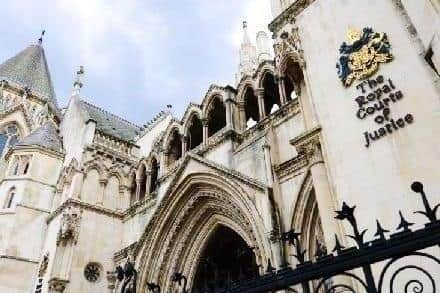Peter Tredget: Arsonist who started killer fires in Hull in 1970s fails in bid to clear his name
Peter Tredget, previously known as Bruce Lee and Peter Dinsdale, had originally confessed to responsibility for the blazes in houses around the East Yorkshire city between 1973 and 1979.
But last year the 61-year-old brought an appeal over 10 counts of arson and 15 of manslaughter, after his case was investigated by the Criminal Cases Review Commission (CCRC).
Advertisement
Hide AdAdvertisement
Hide AdIn a ruling on Tuesday (Feb 8), judges quashed two arson convictions and three of manslaughter, but concluded that his remaining convictions were “safe”.


Lord Justice Fulford, sitting with Mr Justice Hilliard and Lord Hughes, said Tredget’s appeals had been allowed in relation to fires at 9 Gorthorpe in June 1976 and 4 Belgrave Terrace in April 1977.
Tredget has been detained in a secure mental hospital since 1981 after previously pleading guilty to 11 counts of arson and 26 counts of manslaughter on the basis of diminished responsibility in relation to the Hull fires.
During a previous Court of Appeal bid in December 1983, judges upheld most of Tredget’s convictions, but they quashed one count of arson and 11 charges of manslaughter in relation to a fire at an old people’s home in Hessle in 1977.
Advertisement
Hide AdAdvertisement
Hide AdIn a new appeal brought after the CCRC investigated his remaining convictions, Tredget’s lawyers argued that due to his “psychological vulnerability” at the time of his 1980 confessions he was an “unreliable narrator” and no “credence” should be given to his guilty pleas.
Tredget, who has “unswervingly” denied responsibility for all the fires for the last 35 years, was previously assessed as “semi-paralysed down the right side”, with a “withered” arm and a limp, the court was told.
His barrister, Tim Barnes QC, told a Court of Appeal hearing in October: “The degree of physical dexterity required to access some of these properties, carrying a container of paraffin and setting the fires in the way the prosecution allege, would have been extremely difficult if not impossible for someone with such physical disabilities.”
In their ruling, judges concluded that given Tredget’s disabilities it was “impossible” or a “wholly unrealistic suggestion” that he climbed through an upper broken window to enter and leave the Belgrave Terrace premises where 13-year-old Deborah Gould and seven-year-old Mark Jordan died.
Advertisement
Hide AdAdvertisement
Hide AdThey also found that Tredget “could not have been responsible” for the fire at Gorthorpe, where 13-month-old Andrew Edwards died, concluding that his “account of starting the fire under the stairs is an impossibility”.
Judges noted that fire experts “do not exclude arson” in their assessment of other fires, except the one at 12 Selby Street, which was “clearly the result of arson”.
They concluded that in relation to blazes at 70 Askew Avenue, 33 Glasgow Street, 50 Humber Buildings, 7 Minnies Terrace, 43 West Dock Avenue, 2 Brentwood Villas, 407 Troutbeck House and Selby Street it had not been established that Tredget “either did not commit or could not have committed the offences relating to these premises”.
They said his sentences in relation to the upheld convictions were “undisturbed”.
Advertisement
Hide AdAdvertisement
Hide AdMr Barnes previously argued that Tredget’s “low IQ, learning difficulties, personality disorder and other personal characteristics which existed at the time of the confessions and at the time of trial undermine the credibility of the confessions and the pleas”.
He told the court that expert analysis of Tredget’s written confessions taken down by police reveal that they contain passages that were allegedly “completely rewritten” by a senior officer.
Mr Barnes said Tredget frequently changed his story when speaking to the police and doctors over whether he had started the fires and for what reasons.
Some explanations he gave at the time were that it was for financial reasons, that it was due to his upbringing, that he was an accomplice to a more skilled arsonist, that he was drunk, or that fires made him feel relaxed.
Advertisement
Hide AdAdvertisement
Hide Ad“In respect of all the fires there is no identification evidence and no forensic evidence to connect (Tredget) with any of them,” Mr Barnes also noted in written submissions.
Judges acknowledged that “without the confessions to the police there would not have been a case to answer”.
But they concluded: “These convictions depend on the public pleas of guilty, tendered in open court by the defendant who did not lack capacity, who knew what he had and had not done, and when he was in receipt of the best legal advice.”
They rejected arguments that the interviews and the statements under caution should have been “excluded” because they did not comply with rules.
